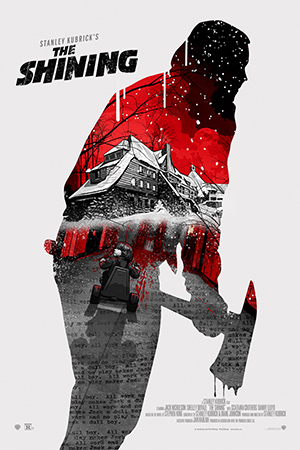I was thrilled to see the great Crime Fiction Lover site has named Killing Quarry one of the best five books of 2019 – it comes in number four (just above someone named Elroy).
And the Borg site has named Ms. Tree: One Mean Mother the Best Comic Reprint Anthology of the year.
The same site calls Murder, My Love as the Best Retro Read of the year.

In preparation for the 4K Blu-ray release of Doctor Sleep, I decided to watch the 1997 TV mini-series, Stephen King’s The Shining. I did this over a two-day period (it’s three 90-minute episodes). I hadn’t looked at the new 4K disc of The Shining yet, and hadn’t seen the film since its original release, although back then I’d gone several times. So I revisited it after taking in the mini-series.
King famously dislikes (and that’s a mild way of putting it) the Stanley Kubrick film, and used his superstardom as a writer to script and executive produce the mini-series. The history of that mini-series rivals the Overlook Hotel in weirdness. Initially it was well-received – highly rated, getting ten out of ten from TV Guide, winning Emmy awards, and generally considered a big success. But over the years its reputation has fallen and it’s even been rated the worst Stephen King adaptation and termed a “crapfest.” Meanwhile, the Kubrick film has only grown in stature.
Twenty-some years on, the mini-series – directed by frequent King screen adapter Mick Garris – strikes me as a decent job with strong performances from its leads, Steven Weber, Rebecca DeMornay and Courtland Mead. Weber has the unenviable job of taking on what had in ‘97 already become a signature Jack Nicholson performance – sort of like starring in a remake of White Heat in the Cagney role – and he is generally very good, suggesting his character’s gradual breakdown and underlying love for his family that King felt (rightly) had been largely lost from the chilly Kubrick version. DeMornay, cast specifically to be worlds apart from Shelly Duval’s abused wife and mother, is excellent, probably the best thing in the film, exuding strength and of course sex appeal. A lot of people seem to despise cute kid Mead, but he does well, delivering lines credibly that many actors of any age would stumble over.
The first two episodes are quite good, but the final one finds King’s dialogue writing (not always a strong suit in his screenplays) making the tasks of all the actors much more difficult, and the harrowing climax of the Kubrick film haunts the mini-series like another nasty ghost in the Overlook, filmed for TV in the real hotel that had inspired King. The limitations of budget and ‘90s CGI make some of the effects – particularly the poor idea of reverting from Kubrick’s hedge maze back to topiary, with shrubbery beasts coming to life (cue Count Floyd) – a big problem.
Returning to the theatrical Shining, I encountered a film whose surface story – including dialogue, although little or none of the clumsy stuff – right out of King. What differs was the motivation of the Jack Torrance character, who (and King hated this) is clearly at the outset a disturbed human who is a parent at least mildly disgusted by his wife and kid. He’s a rather classic abusive father and husband. Duval is often characterized as whiny and weak, even by fans of the film, but really she never whines and eventually grows a spine in defense of herself and her child. She seems right – just the sort of victim of a wife a prick like Nicholson’s Torrance would choose. Torrance is an alcoholic who, enraged, hurt his son and has been on the wagon for five months, and resents his family for that.
The problem with Kubrick’s version, for me, has always been the puzzling response to it, and not just by King. That response has been characterized by numerous interpretations of what the film means (including a feature-length documentary, Room 237), and what Kubrick is up to. Yet it’s one of the most straightforward horror films imaginable – it’s a deal-with-the-devil yarn, obviously so. Alcoholic Torrance, in a big empty ballroom, seated at the bar, says out loud that he would sell his soul for a drink. A ghostly bartender in a red vest with lapels suggestive of devil horns pops up and pours him a drink. From then on, Jack is both drunk and drinking on the house – “Your money is no good here, Mr. Torrance.”
There is even a suggestion that the contract was signed much earlier, when Torrance agrees to become caretaker of the Outlook, after a conversation with the manager – a guy in red pants. Later Torrance has a conversation with the ghost of the prior caretaker – now a waiter in the Overlook – in a strikingly Kubrick-ian restroom that is wildly, predominantly red.
Red. Get it?
And at the end we see Jack (Nicholson/Torrance) in a photo at a New Year’s Eve party taken in 1921, where he has obviously joined the lost souls in the Hell (or perhaps Purgatory) of the Overlook. Oops – I guess I was supposed to say, “Spoiler Alert.” (In case you missed it, Damn Yankees is also a deal-with-the-devil movie.)
Nicholson’s performance is over the top throughout, but waaaay over once he’s taken that devilish drink. He becomes, at that point, the monster in a monster movie. He is right out of a Nightmare on Elm Street-style horror flick, complete with Freddy Krueger-ish quips – though in fairness, Nightmare came out four years later, so the inspiration probably flowed from the Overlook to Elm Street. In any case, Torrance, chasing his family around the haunted house of a hotel, is right in tune with the slasher craze just then perking.
And I’m fine with that. It seems a valid take on the material, and it demonstrates that movies taken from successful novels don’t have to mirror their subject matter, even thematically, to be good. Would Kiss Me Deadly have been a better movie if it had been rigorously faithful to Mickey Spillane? Absolutely not. I love The Girl Hunters, Mickey’s controlled film of a book of his, in which he himself played Mike Hammer. But no one seriously, credibly, considers The Girl Hunters a better film than Kiss Me Deadly – even though Kiss Me Deadly set out to make a monkey out of Mike Hammer.
Do I wish the film of Road to Perdition had used more of my dialogue, and in particular my ending? You bet. But it’s a great film and I am thrilled and grateful for its existence. Had Stanley Kubrick made a movie out of one of my books and peopled it with sock puppets, I would’ve felt honored.
But Kubrick, who had his faults (much of King’s criticism of the theatrical film is understandable and even correct), is relatively faithful to the source material, even surprisingly so. It’s his take on Torrance that differs. It’s no accident that the most memorable things about the film are not in King – the spooky twins, the tike on a trike going down corridors in pioneering Steadi-cam shots, the elevator cascading blood, the hedge maze, “All work and no play makes Jack a dull boy,” and even “Here’s Johnny” (which post-Johnny Carson is not working as well as it used to, but…).
Nicholson may have been set loose by Kubrick, who was not an actor-oriented director. Kubrick liked to cast really strong actors – Peter Sellers, Malcolm McDowell, James Mason – and let them go for it. And his best films often benefit from that. Nobody thinks the acting of the leads in 2001 and Barry Lyndon is worthy of high praise.
But Nicholson wasn’t always a ham – his work as Jake Gittes in Chinatown alone is incredibly nuanced. As uncomfortable as it might have made Stephen King, Nicholson in The Shining is right in there with Freddie Krueger, Michael Meyers and Jason Vorhees, though none of them were ever at the center of a film so accomplished. And assuming Kubrick left Nicholson to his own manic devices, the director surely did so knowingly.
Circling back to Doctor Sleep, which I’ve discussed here before, what director/writer Mike Flanagan pulls off is something damn near magical: a film that works well as a sequel to both Kubrick and King (who has reportedly warmed to the theatrical film in the context of this one).
But remember – if you are really, really thirsty, and a ghostly bartender in a red jacket with horn lapels shows up, right after you say you’d sell your soul for a drink? Take a pass.
Drinking on New Year’s is for amateurs, anyway.

This was our first Christmas with our son Nate, his wife Abby and our two grandkids, Sam and Lucy, here in Muscatine, living just up the street. We had a wonderful time and Barb cooked a fine Thanksgiving-style turkey dinner on Christmas Eve that she swears will be her swan song as a holiday chef. We’ll see.
We had the week before gone to visit Barb’s mother (and sister Cindy) in Bowling Brook, Illinois. While in that part of the world, we dined at one of our favorite restaurants, White Fence Farm, who really deck out their already wonderfully eccentric venue for Christmas.

No New Year’s Eve gig this year for Crusin’. First of all, we rarely play during the winter, and second, what had once been a regular gig for musicians is now much less of a one. I will not be sorry to be home with Barbie having champagne while we watch It’s a Wonderful Life.
Next year will be a big one – half a dozen books are coming out, and I’ll get into that next time. I am today writing the introductory essay to The Complete Dick Tracy Volume 28 – one volume left to go, meaning I will have written about the entire Gould run. No word yet whether IDW will continue on with Gould/Fletcher/Collins (and after that Locher/Collins).
I will be starting the new Nolan (!) novel in a few days. First I have to put finishing touches on the Eliot Ness/Butcher non-fiction tome by A. Brad Schwartz and myself. We delivered it a while back but the editor had notes and suggestions. The announced title, The Untouchable and the Butcher, with various subtitles but probably Eliot Ness, the Torso Killer and American Justice, is suddenly in question. We are still lobbying for that, but are also considering (with the same subtitle) Knight in the Dark City and Shadow of the Butcher.
Opinions?
See you next year.
M.A.C.